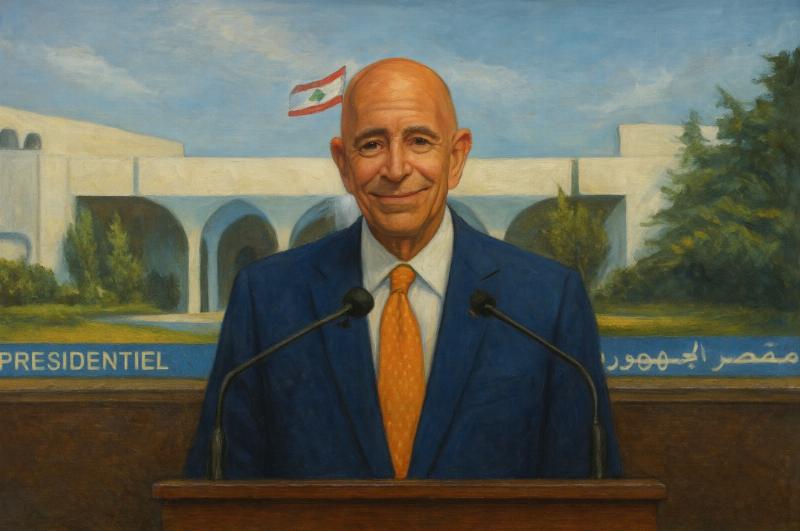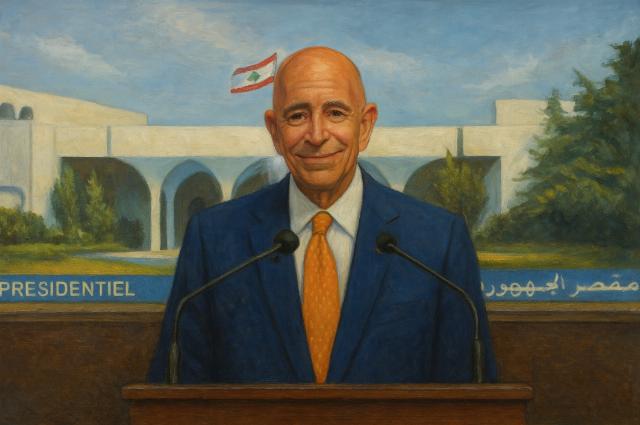


It is rare to see a seasoned diplomat describe a country’s half-formed political promise as “spectacular,” but Thomas Barrack, the U.S. special envoy to Syria and ambassador to Turkey, appears to believe he has witnessed nothing short of a miracle in Lebanon. Following a visit to Baabda Presidential Palace on July 7th, Barrack praised the Lebanese government’s purported commitment to disarming Hezbollah, a group he generously rebranded as a political movement with “a militant aspect.”
His glowing rhetoric suggests either a profound naiveté or a performative satisfaction aimed at placating American audiences. Either way, it misreads the depth of Lebanon’s institutional weakness, the complexity of Hezbollah’s entrenchment, and the enduring regional calculus.

Image created using a ChatGPT prompt.
Lebanon is not a normal state, and Hezbollah is not just another political party. It is a highly organized, Iranian-backed paramilitary force that maintains a parallel state structure, independent finances, and command over swaths of territory, especially in the south. Any talk of its “disarmament,” particularly following a bruising but inconclusive war with Israel, should be met with skepticism, not applause. And yet Barrack seems to treat vague government assurances as deliverables, declaring himself “unbelievably satisfied.”
Hezbollah, for its part, has made clear through its leader Naim Qassem that it has no intention of surrendering its weapons. Lebanon’s political class echoes the same defiance, offering cosmetic reforms while maintaining the status quo. You’re not dealing with statesmen — you’re dealing with warlords in suits, who have kept Lebanon hostage for decades. You’re not witnessing a rebirth — you’re watching the same old play with new lighting. The script hasn’t changed: delay, deflect, deceive.
More troubling, however, is Barrack’s sanitizing of Hezbollah’s record. In describing the group as needing a “future,” and envisioning a peaceful “intersection of prosperity” for its members, he seems to forget (or deliberately overlook) that Hezbollah has American blood on its hands. This includes the 1983 bombing of the U.S. Marine barracks in Beirut, which killed 241 American servicemen, making it the deadliest single-day death toll for the U.S. Marine Corps since World War II.
And that was not the end of it. The following year, Hezbollah operatives kidnapped William Buckley, the CIA station chief in Beirut. He was held for 15 months, during which he was tortured mercilessly. By the time Hezbollah released a video of him, his body was so visibly broken that U.S. intelligence analysts could hardly recognize him. He was ultimately murdered, a brutal message to the United States that Iran’s proxy would operate with impunity.
To speak now of offering Hezbollah “a future” in the Lebanese state without acknowledging its past is not only morally obtuse but strategically reckless. The implication—that the group might voluntarily demobilize if given economic incentives and diplomatic courtesies—ignores the ideological depth, military discipline, and regional utility that make Hezbollah so indispensable to Tehran and so impervious to soft power persuasion.
Moreover, the notion that any diplomatic dialogue will prompt Hezbollah to disarm borders on magical thinking. Hezbollah’s raison d’être has always been resistance, not merely to Israeli occupation but to any vision of Lebanon that threatens its dominance or aligns too closely with Western liberalism.
The more plausible outcome of Barrack’s effusive praise is not Hezbollah’s disarmament, but its quiet re-consolidation. By prematurely declaring diplomatic success, he risks removing the already limited pressure on Lebanon’s leadership to assert real sovereignty over territories Hezbollah controls. Worse, he hands Hezbollah an opportunity to stall, rebuild, and recalibrate under the cover of “dialogue.”
Real diplomacy is built on leverage, not language. If the goal is a stable, sovereign Lebanon, then Washington must be clear-eyed about the forces destabilizing it, and consistent about calling them out. Hezbollah does not need an invitation to legitimacy. It needs containment, pressure, and a reckoning with the decades of violence it has unleashed and accountability for the many innocent lives it has taken, including many American lives.
Tom Barrack may believe he is charting a path toward peace. In reality, he risks enshrining the very actors who have done most to ensure that peace remains forever out of reach.
Weeks ago, I warned in “Tom Barrack Is Shaming Donald Trump,” that Barrack’s soft diplomacy in Lebanon was a liability to this administration. Morgan Ortagus, who served as the U.S. Deputy Presidential Envoy for the Middle East and was Barrack’s predecessor in Lebanon, wasn’t afraid to rattle some cages. Her tough, no-nonsense approach shook Lebanon’s political elite and put real pressure on Hezbollah and its backers. Everyone knew she meant business, and that’s exactly what’s needed. Barrack’s softer tone, by comparison, only makes the corrupt Lebanese leadership more comfortable and risks losing the momentum Ortagus built.
From all his actions and his weak approach to date, I can’t tell if Barrack is President Trump’s envoy or Lebanon’s apologist. It’s worth remembering that he is operating within a U.S. foreign policy apparatus still largely shaped by liberal Democratic bureaucrats. Many Biden holdovers are entrenched State Department officials, and they continue to steer Lebanon policy. This includes the U.S. ambassador to Lebanon, Lisa A. Johnson, a Biden administration holdover whose cautious approach seems to align with a status quo that tolerates Hezbollah’s grip rather than confronts it. From my own insights into the U.S. Embassy in Lebanon, most of the staff are anti-Trump, crazy liberal, and the entire embassy structure leans heavily against Trump’s policies.
As a loyal supporter of President Trump since 2016, I believe it’s time for him to remove the Lebanon file from Barrack’s hands. America does not surrender to its enemies, and we certainly should not have a U.S. envoy publicly suggesting that Hezbollah—an Iranian proxy with American blood on its hands—deserves a future or a path to prosperity. Barrack’s statements are not only weak and disconnected from reality but deeply shameful. This is not the America-first leadership we need. It’s time for a change, one that demands strength, accountability, and unwavering opposition to those who threaten our nation’s security.
